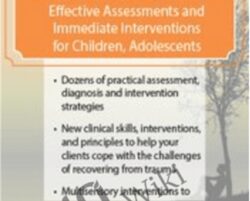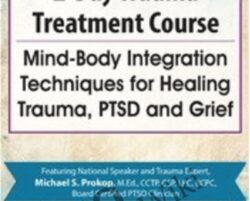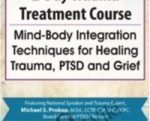Are you confident in your clinical work with clients suffering from trauma or PTSD?Or do you have a pit in your stomach after a session with a traumatized client because you fear that you may have done more harm than good?Despite our best intentions, clients are often triggered or even retraumatized by talking about their experiences before they have the skills to regulate their emotions, calm their bodies and focus on the present.This common treatment pitfall can lead to client’s withdrawing from the experience, avoiding their thoughts and feelings, or ending therapy all together. By incorporating mindfulness skills, clinicians can help clients to tolerate distressful memories, triggers and emotions in-order-to successfully begin to navigate their trauma narrative and move into post-traumatic growth.Watch this recording and you will take away evidence-based, best-practice clinical interventions based on the neuroscience of traumatic stress with effective mind-body treatment approaches to have better clinical outcomes! Leave this course with more confidence in your trauma work!Analyze the impact of trauma and disrupted attachments on the structure and function of the developing mind and brain.Assess a client’s sensory, emotional and cognitive reactions to a traumatic event and develop a brain-based integrated treatment program.Describe why premature cognition can often re-traumatize a client and how sensory-motor processing can alleviate traumatic re-experiencing.Examine how traumatized clients process internal and external information.Incorporate self-regulation and relaxation techniques for trauma symptoms and traumatic growth.Correlate how adverse childhood experiences (from the ACEs Study) impact brain development, emotion regulation & cognition.Integrate specific techniques that enhance attention, interoception, affect regulation, physical mastery and sensory-motor awareness.Summarize the recent advances in the neurobiology of trauma and complicated grief and how it can impact your clinical work.Practice body awareness to stabilize, ground and center traumatic sensations and emotions in your clients.Utilize body-based and cognitive treatment approaches in your clinical practice with traumatized clients.Integrate Sensory Experiencing, Affect Regulation, CBT and Embodied Mindfulness to more effectively treat the whole person.Modify your clinical assessment and intervention strategies when working with traumatized children and adolescents.Get Trauma Treatment Course: Mind-Body Integration Techniques for Healing Trauma, PTSD and Grief of author Michael Prokop only price 119$The Neuroscience of TraumaThe Triune Brain and the neurobiology of traumatic stressHow trauma is held in the bodyArousal management, learned helplessness, and fear regulationEnhance affect regulationSomatic re-experiencing of trauma to “attend and befriend” traumatic body sensations and feelingsTrauma and Complicated GriefStages of loss and recoveryHow trauma “freezes” the normal grieving processSigns of complicated/traumatic griefFactors contributing to complexities in griefGrief, bereavement in DSM-5® and viable treatment implicationsAssessment of Traumatic StressDiagnostic and Statistical Manual of the APAACEs (Adverse Childhood Experiences) Study and Developmental TraumaDiagnose PTSD with the PCL-5Treatment Approaches to Treat TraumaMindfully observing sensations, feelings, perceptions, and thoughtsBottom-up: somatic interventions, sensory motor integration, breathworkTop-down: CBT, Rational Emotive Therapy, Positive Self TalkHorizontal: EMDR, Bilateral stimulationReprocess and Transform Trauma: Treatment StrategiesUse titration, grounding, centering and pendulationIntegrate body-oriented and neurologically-based therapy with CBTEmbodied mindfulnessCoherent story/experiences and metabolization of traumatic memoriesBreathwork, Progressive Muscle Relaxation, and AutogenicsMultisensory Guided Imagery and systematic desensitizationSelf-regulation and relaxationArt-therapy, play and theatre movement-based interventionsSensory integrationMindfulness with self-compassionPosttraumatic Growth: Empowerment and ResiliencePositive Psychology InterventionsNavy Seal Mental Toughness ModelInstill optimism, hope, curiosity and imaginationForgiveness, gratitude and positive emotionsRenewed sense of meaning and purposeUse signature strengthsEnhance relationships and social supportSelf-esteem, self-efficacy and resilienceVolunteering and givingReconnection to self, family, society and hopes/dreamsTraumatized Children and Adolescents: The Developing Brain, Body and MindHigh risk characteristics, pre-natal and early life traumaMirror neuron systems, attachment, RAD and brain developmentDisassociation, self-blame, guilt, and shameSelf-regulation, Interpersonal Neurobiology, impulse control, and frustration toleranceIntegrate Body Work and Trauma Focused CBT for childrenBrain-based interventionsLimitations of Research and Potential RisksNo “one size fits all” for any modality of trauma treatmentVarious definitions of trauma with different treatment implicationsSide effects may include an initial increase in symptomsEmpirical verses anecdotal evidenceGet Trauma Treatment Course: Mind-Body Integration Techniques for Healing Trauma, PTSD and Grief of author Michael Prokop only price 119$Tag: Trauma Treatment Course: Mind-Body Integration Techniques for Healing Trauma, PTSD and Grief – Michael Prokop Review. Trauma Treatment Course: Mind-Body Integration Techniques for Healing Trauma, PTSD and Grief – Michael Prokop download. Trauma Treatment Course: Mind-Body Integration Techniques for Healing Trauma, PTSD and Grief – Michael Prokop discount.
 Your Instant Life Revolution – Michael Norman
₹2,988.00
Your Instant Life Revolution – Michael Norman
₹2,988.00
 Trauma, PTSD & Complicated Grief: Effective Assessments and Immediate Interventions for Children, Adolescents and Adults
₹12,450.00
Trauma, PTSD & Complicated Grief: Effective Assessments and Immediate Interventions for Children, Adolescents and Adults
₹12,450.00
Trauma Treatment Course: Mind-Body Integration Techniques for Healing Trauma, PTSD and Grief – Michael Prokop
₹19,090.00




